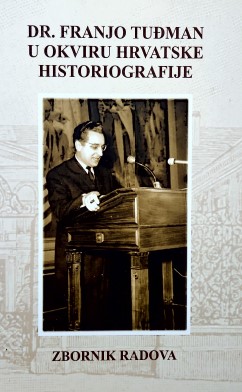DR. FRANJO TUĐMAN IZMEĐU POLITIKE I POVIJESTI: POVIJESNA PREDODŽBA O HRVATSTVU I JUGOSLAVENSTVU, SLAVENSTVU I INTERNACIONALIZMU
FRANJO TUĐMAN BETWEEN POLITICS AND HISTORY: HISTORICAL VIEW OF THE CROATIAN AND YUGOSLAV IDEA, PAN-SLAVISM AND INTERNATIONALISM
Author(s): Nikša Stančić
Subject(s): Political history, Recent History (1900 till today), Government/Political systems, Methodology and research technology, 19th Century, Politics of History/Memory, Politics and Identity
Published by: Hrvatski institut za povijest
Keywords: Franjo Tuđman; Croatian idea; ideas of unity of Southern Slavs; pan-Slavism; Croatia; Yugoslavia; Europe;
Summary/Abstract: Croatian history and the changes of Croatia’s political position in the tides of European history, in particular in the 19th and 20th centuries, were in the focus of Franjo Tuđman’s historical research, wherein he paid special attention to political ideas and programs in the period that had shaped the identity of the modern Croatian nation and the program of its political independence, the period in which different variants of pan-Slavism and the ideas about Southern Slavic/ Illyric/ Yugoslav unity had played an important role in the formation of political programs and their implementation both in Croatia’s political forces and the political forces in Croatia’s immediate environment. He noted the continuity of Croatia’s struggles for a higher level of independence in multinational states, first in the Habsburg Monarchy, and later in Yugoslavia, and felt that the different variants of pan-Slavism and idea about Southern Slavic unity in Croatian politics had emerged from the political position of the Croatian territories in individual periods or from political situations (political dividedness and exposure to denationalization attempts in the Habsburg Monarchy, danger of the Croatian territory being divided at the time of World War I, and so on). On the other hand, Tuđman observed how these ideas were used for imperial purposes, for instance, how pan-Slavism was used in the service of Russian imperial politics, and how the idea about the unity of Southern Slavs was used to implement the program of Great-Serbian hegemony. He tracked the continuity of the existence and the political implementation of different forms of pan-Slavism and South-Slavic ideas to the time when he wrote his research papers, mostly the 1960s, a period in which Croatia was a part of the Social Federalist Republic of Yugoslavia, and the world was in the middle of the Cold War between two social, political, and military blocks. Tuđman felt that both the Universalist idea about world integration on the foundations of modern technological accomplishments, advocated by «Western democracies», and the Soviet insistence on socialist internationalism and limited sovereignty of the socialist countries were manifestations of imperial goals at the expense of small and dependent nations. He contrasted these two ideas with the activities of the Nonaligned Movement and the idea about coexistence in a world divided into blocks, the activities of the United Nations, the process of colonial territories establishing their national independence, and the headway of the idea about a united Europe, which he felt to be Europe’s way of distancing itself from both the United States and the USSR.
- Page Range: 41-58
- Page Count: 18
- Publication Year: 2011
- Language: Croatian
- Content File-PDF

